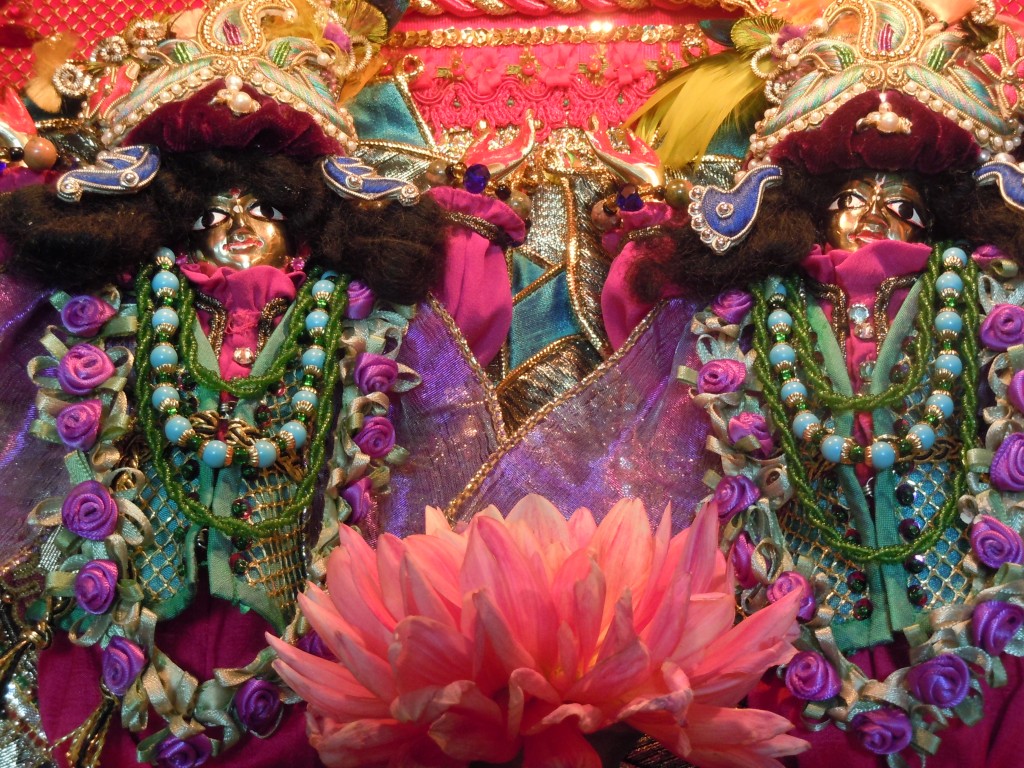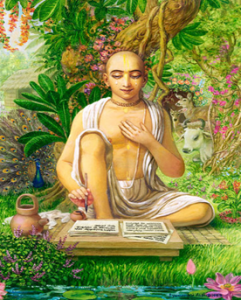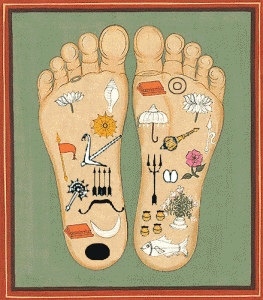
Hare Krsna
Below we have some nice instructions by Srila Prabhupada regarding doing kirtan 4 hours in the public as opposed to just trying to give them basic Vedic instructions from BG or SB.
Kalau sudra sambhava-everyone is born a sudra in kali yuga but by following the sadhana bhakti process of purification, eventually we all become eligible to hear the words of instructions of the Mahatmas, such as Srila Prabhupada. But,before that-just do kirtan, because they wont understand a word you say. And will waste your time by arguing.
At the end of this lecture Srila Prabhupada explains how the param para is lost by people making their own interpretations. This is what we had before Srila Prabhupada preached all over the world, and now that he has physically left, so many concoctions and mis-interpretations are once again going on. And done in his name !!
Hare Krsna
damaghosa das
———————–
Srimad-Bhagavatam 5.5.2 — Vrndavana, October 24, 1976 : 761024SB.VRN :
This is mahātmā. So you have to approach such mahātmā. That is recommendation in the Bhakti–rāsamṛta–sindhu: ādau gurvāśrayam sadhu mārgānugamanam sad–dharma pṛcchāt. These are things wanted. So if you actually want to execute tapasya, then you must approach a person who has already executed tapasya, tapo divyam [SB 5.5.1]. Then you’ll get the things. Mahat–sevām. And there you have to render your service. In humbleness, service, sevayā. You can question mahātmā not by challenging but surrounded by praṇipāt and sevā. Otherwise, you have no right to question. Just like this man went to Rūpa Gosvāmī. He has no right to waste time. So actually this discussion, instructions, are to be executed amongst the guru and the disciples, where there is submission. Otherwise there is no need of. Nowadays we hold some meeting. Some ordinary people they come to hear. But that kind of discussion Caitanya Mahāprabhu never did. Never did. Because these outsiders, they are not submissive. They come to see the fun. They do not come to learn something. Therefore Caitanya Mahāprabhu never made any big meeting. In big meeting He was present, but kīrtana, saṅkīrtana. He was meeting in big meeting daily in the evening for four hours in Jagannātha temple, but the whole period of time was engaged in chanting Hare Kṛṣṇa. But when there was a person like Sarvabhauma Bhaṭṭācārya or Prakāśānanda Sarasvatī or Rāmānanda Rāya, like such exalted person, He used to discuss. Otherwise, He was not discussing. There was no need of discussing, because they do not approach with that humbleness. They think… Just like Kṛṣṇa and Arjuna. So long Arjuna was thinking that “Kṛṣṇa is my friend. I shall reply Him equally,” then Kṛṣṇa was very gravely speaking. But when Arjuna understood that “This kind of talking there will be no benefit,” then he became His disciple: śiṣyas te ‘ham śādhi māṁ prapannam [Bg. 2.7]. “There is no more discussion. Now I accept You as my guru.”
Guru means whatever instruction he’ll give, we have to accept without any argument. Vedic knowledge is like that. You cannot interpret. As it is, you have to accept. Similarly guru’s word also you have to accept. No argument. That is Vedic knowledge. That is the Vedic system. This example we have given many times. Just like this cow dung. Cow dung is the stool of an animal. So the stool of an animal is most impure thing. As soon as you touch. Even your own stool. You may be very learned scholar or devotee, but that does not meant you can touch your own stool and remain purified. No. Immediately you have to take bath. Even his own, what to speak of others’. But in the Vedic instruction we see that the cow dung, it is the stool of an animal also, lower animal than the man, and it is pure, it is said. So you have to accept pure. No argument that “Such stool is impure, even my spiritual master’s stool is also impure. How is that that animal cow dung is pure?” But because it is in the Vedas it is said pure, you have to accept. Similarly the conchshell, it is the bone of an animal. The bone, if you touch any dead body’s bone, you’ll have to take, immediately purify. But that, this bone is placed in the Deity room. We are daily blowing the conchshell—because the Vedic instruction. So there is no argument. If you accept Vedic instruction, you have to accept it as it is.
Therefore we are protesting to all these rascals who are making interpretation of Bhagavad-gītā, “You rascals, you cannot do anything. You have to accept Kṛṣṇa’s word. That is Vedic knowledge. And if, you rascal, if you interpret, then you are lost and everything is lost.” Yogo naṣṭaḥ parantapa. As Kṛṣṇa says,
As soon as you give up this paramparā system, immediately the whole thing is lost, sa kālaneha… Otherwise what was the use of Kṛṣṇa speaking again to Arjuna? Because Bhagavad-gītā was there current, but Kṛṣṇa said because the paramparā system is lost, every rascal is interpreting. This is the system always. As soon as some time goes away, so many rascals come and they interpret Bhagavad-gītā in their own rascaldom way. That is lost. Sa kāleneha yogo naṣṭaḥ parantapa. Therefore I am advising you again. You take it. So if we take Bhagavad-gītā in that way—or any śāstra—through the paramparā channel, then it is all right. Just like this example. This is Vedic instruction, Vedic order: “Yes, cow dung is pure.” We have to take it. This is paramparā. “Yes, conchshell is pure. Although it is bone, never mind. It is pure.” The order.
So spiritual master’s order, because we do not know, therefore we have to approach mahātmā who can give me right instruction. So mahat–sevā. So if you go to spiritual master… Mahātmā and durātmā. Two words are there opposite: brāhmaṇa and a kṛpana. Brāhmaṇa mean one who has understood the Lord, the Supreme Brahman, Kṛṣṇa, Parambrahman. He is brāhmaṇa. And means one who is bhakta, he is brāhmaṇa. A bhakta is brāhmaṇa, and a brāhmaṇa is not a bhakta, not necessarily. Because if he does not know… A brāhmaṇa may know what is Brahman, but he may not know what is Kṛṣṇa. So a brāhmaṇa has to become a Vaiṣṇava Then he is perfect. Brāhmaṇa–Vaiṣṇava. Brāhmaṇa–paṇḍita. Otherwise, if he remains simply a brāhmaṇa, then he cannot become guru. That is the instruction.
Ṣaṭ-karma-nipuṇoḥ vipraḥ. Vipra means brāhmaṇa. And he knows everything, karma–kāṇḍīya. Ṣaṭ-karma. Paṭhan pāṭhan yajan yājan dāna pratigraha. Everything. Mantra–tantra-viśaṛada. He is very expert in karma–kāṇḍīya activities, ṣaṭ–karma-nipuṇoḥ vipraḥ. And mantra–tantra-viśārana: and he knows how to chant very correctly the Vedic hymns, mantra–tantra, and the tantra śāstra—everything complete. But if he’s not a Vaiṣṇava, ṣaṭ–karma-nipuṇoḥ vipraḥ mantra–tantra-viśārana avaiṣṇava gurur na sa syāt. If he’s not a Vaiṣṇava, he cannot take the position of a spiritual master. No. One should not go there. He’s not mahātmā. He’s still durātmā, because he does not know Kṛṣṇa. His knowledge is not complete. His knowledge will be complete, as Kṛṣṇa says, bahūnāṁ janmanām ante [Bg. 7.19]. If he continues to be very learned brāhmaṇa for many, many births, then if he comes to his senses, bahūnāṁ janmanām ante jñānavān māṁ prapadyante, then he becomes Vaiṣṇava, when he surrenders to Kṛṣṇa. Because by his cultivation of knowledge he can understand vāsudevaḥ sarvam iti [Bg. 7.19]. Then he is Vaiṣṇava. To such mahātmā we have to approach. Then our life is successful.
Thank you very much. (end)




